December 2025
The automotive infotainment testing platform market is projected to reach USD 3.93 billion by 2034, growing from USD 2.16 billion in 2025, at a CAGR of 6.88% during the forecast period from 2025 to 2034.
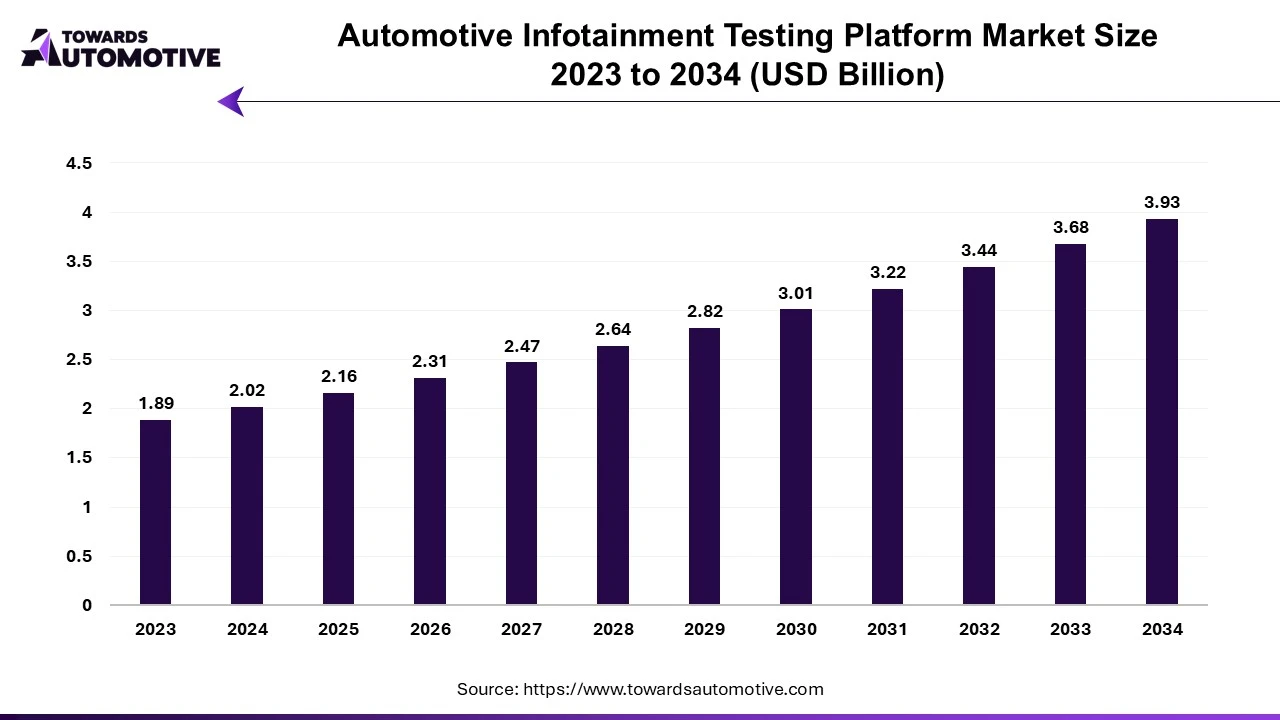
The automotive infotainment testing platform market is experiencing significant growth, driven by the increasing demand for advanced in-car technologies and the integration of cutting-edge infotainment systems. As automakers prioritize enhancing the driving experience, automotive infotainment systems have become central to vehicle offerings, with features like navigation, multimedia entertainment, connectivity, and voice recognition. These systems are essential in meeting consumer expectations for seamless integration with smartphones, digital assistants, and other smart devices.
To ensure the reliability, functionality, and safety of these complex infotainment systems, automotive manufacturers and suppliers are increasingly relying on specialized testing platforms. These platforms allow for rigorous validation, simulation, and performance evaluation of infotainment systems across various scenarios and environmental conditions. This growing need for effective testing solutions, combined with advancements in automotive technology such as 5G connectivity, artificial intelligence (AI), and over-the-air updates, is driving the market for infotainment testing platforms.
As automotive infotainment systems evolve and become more sophisticated, testing platforms must keep pace with emerging technologies to ensure compatibility, security, and user experience. This has led to the development of innovative testing methodologies and tools, including simulation-based testing, automated testing, and real-time performance analysis. The automotive infotainment testing platform market is poised for continued expansion as the automotive industry embraces these advanced systems to meet the evolving needs of consumers and regulatory requirements.
AI plays a crucial role in the automotive infotainment testing platform market by enhancing the efficiency, accuracy, and scope of testing procedures. With the increasing complexity of modern infotainment systems, which integrate features like voice recognition, navigation, connectivity, and multimedia capabilities, traditional testing methods are no longer sufficient to meet the demands of the automotive industry. AI-powered testing platforms offer solutions to address these challenges by enabling more sophisticated, automated, and scalable testing processes.
One of the key roles of AI in this market is in automating test case generation, execution, and analysis. AI algorithms can simulate a wide range of real-world scenarios, testing infotainment systems under varying conditions without manual intervention. This includes evaluating the system’s response to different environmental factors, connectivity issues, or software updates. AI can also be used to create more intelligent test scripts, improving the detection of bugs, performance issues, and security vulnerabilities in infotainment software.
Additionally, AI enhances the ability to perform real-time monitoring and analysis of infotainment system performance during testing. Machine learning algorithms can detect patterns and anomalies that may go unnoticed in traditional testing, enabling more proactive identification of potential issues. Furthermore, AI can support the integration of voice recognition and natural language processing (NLP) testing, ensuring that voice-activated features meet user expectations and operate accurately across multiple languages and accents.
Thus, AI-driven testing platforms help automakers ensure the reliability, security, and user-friendliness of infotainment systems, supporting the growing demand for high-quality, feature-rich automotive technologies.
The rising demand for electric vehicles (EVs) is a major driver of growth in the automotive infotainment testing platform market. As the automotive industry shifts toward electric mobility, EVs are incorporating increasingly sophisticated infotainment systems to enhance the user experience. These systems often include features such as advanced navigation, connectivity with mobile apps, over-the-air (OTA) software updates, and integration with the vehicle's battery and energy management systems. To ensure these systems perform seamlessly, automakers must invest in comprehensive testing platforms that can evaluate the compatibility and functionality of infotainment solutions in EVs.
Moreover, with the growing adoption of EVs, the complexity of infotainment systems is rising, requiring more advanced testing tools capable of simulating various scenarios in a virtual environment. The integration of EV-specific features, such as range optimization, energy-saving features, and battery status displays, demands rigorous testing to ensure they work flawlessly with the infotainment systems. Furthermore, as the EV market expands globally, automakers are increasingly relying on infotainment testing platforms that can address regional differences in connectivity standards, user preferences, and regulatory requirements. The increasing importance of infotainment systems in EVs, coupled with the need for high-quality, secure, and reliable features, is driving the demand for advanced testing solutions, fueling the growth of the automotive infotainment testing platform market.
The automotive infotainment testing platform market faces several restraints, including high implementation costs and the complexity of integrating advanced technologies. Developing comprehensive testing platforms requires significant investment in infrastructure, software, and skilled personnel, which may deter smaller manufacturers. Additionally, the rapid pace of technological advancements in infotainment systems can lead to frequent updates and upgrades, posing challenges in keeping testing platforms up to date. Furthermore, the varying standards across different regions and manufacturers can complicate the standardization of testing procedures.
The integration of big data analytics presents significant opportunities in the automotive infotainment testing platform market by enabling more efficient and data-driven testing processes. As infotainment systems become increasingly complex, the need to analyze vast amounts of data generated by these systems during testing is growing. Big data analytics allows for the real-time collection, processing, and interpretation of test data, providing deeper insights into the performance, reliability, and user experience of infotainment systems. By leveraging big data, testing platforms can predict potential issues, identify patterns, and optimize test scenarios, leading to more accurate and efficient testing cycles.
Additionally, big data enables predictive maintenance, allowing automakers to anticipate and address issues before they affect the system's performance, thereby enhancing the overall quality of the infotainment experience. This integration also supports the development of personalized infotainment features based on user behavior and preferences, ensuring that systems meet the needs of different customers. Furthermore, big data analytics helps automakers comply with safety, security, and regulatory standards by providing detailed reports and insights that can be used for certification and validation processes. As automakers continue to enhance the complexity and functionality of their infotainment systems, the integration of big data analytics into testing platforms will become an essential tool, creating substantial growth opportunities in the automotive infotainment testing platform market.
The cloud-based platforms segment held a dominant share of the market. The cloud-based platforms segment is a key driver of growth in the automotive infotainment testing platform market, as they offer significant advantages in terms of scalability, flexibility, and real-time data access. With the increasing complexity of automotive infotainment systems, automakers are turning to cloud-based platforms to streamline their testing processes. These platforms enable the simulation and testing of infotainment systems in various virtual environments, reducing the need for extensive hardware setups and physical testing. Additionally, cloud-based platforms provide the ability to remotely access testing data and results, facilitating collaboration between global teams and accelerating the development cycle.
As automotive systems become more interconnected, the ability to test infotainment features like voice recognition, navigation, and multimedia streaming in a cloud environment allows manufacturers to ensure these systems work seamlessly across different devices and network conditions. The adoption of cloud-based platforms also supports the integration of over-the-air (OTA) updates, enabling automakers to test and validate software updates in a centralized environment before deploying them to vehicles. Furthermore, cloud platforms offer robust security features that help protect sensitive user data, a critical consideration in the age of connected cars. With these benefits, cloud-based platforms are becoming an essential component in the automotive infotainment testing market, driving its growth and enabling manufacturers to deliver high-quality, reliable infotainment systems.
The passenger cars segment led the industry. The passenger cars segment plays a significant role in driving the growth of the automotive infotainment testing platform market, primarily due to the increasing demand for advanced infotainment systems in modern vehicles. With consumers expecting seamless connectivity, personalized experiences, and cutting-edge entertainment options, automakers are integrating sophisticated infotainment systems into their passenger cars. These systems include features such as real-time navigation, voice control, wireless connectivity, and multimedia streaming, all of which require rigorous testing to ensure they function reliably and meet high user expectations. As the complexity of infotainment systems continues to increase, there is a growing need for testing platforms that can evaluate the integration of these systems with various vehicle components, such as navigation, communication, and control systems.
Moreover, as automakers seek to differentiate themselves in the highly competitive passenger car market, there is an increased focus on enhancing the user experience through intuitive, responsive, and secure infotainment systems. This has led to a surge in investment in advanced testing platforms to ensure that these systems perform seamlessly under various real-world conditions. The growing emphasis on features like voice recognition, AI-powered assistance, and over-the-air (OTA) software updates further drives the demand for robust infotainment testing solutions, making the passenger car segment a key factor in the expansion of the automotive infotainment testing platform market.
Asia Pacific dominated the automotive infotainment testing platform market. The growth of the automotive infotainment testing platform market in the Asia Pacific (APAC) region is significantly driven by the increasing focus on safety and security, regulatory compliance and standards, and rising consumer expectations. As the automotive industry in APAC becomes more advanced, there is a growing emphasis on ensuring that infotainment systems meet stringent safety and cybersecurity standards. Governments in countries like Japan, South Korea, and China are implementing strict regulations regarding data privacy, cybersecurity, and the safe integration of infotainment systems with other vehicle technologies. This creates a demand for robust testing platforms that can thoroughly assess and validate the security and functionality of infotainment systems, ensuring compliance with these regulations.
Additionally, consumer expectations in APAC are rising, with customers seeking more advanced and seamless in-vehicle experiences, such as connected services, voice recognition, and real-time updates. Infotainment systems must not only be feature-rich but also reliable, secure, and user-friendly. As a result, automakers in APAC are investing in sophisticated testing platforms to meet these high standards and deliver superior infotainment experiences. These factors combined with the fast-paced technological advancements in the region contribute to the growing demand for automotive infotainment testing platforms in APAC, ensuring that manufacturers can meet regulatory, safety, and consumer requirements effectively.
North America is expected to grow with the highest CAGR during the forecast period. Investment in over-the-air (OTA) updates, innovation in the automotive sector, and the growth of electric vehicles (EVs) are key drivers of the automotive infotainment testing platform market in North America. Over-the-air updates allow automakers to deliver software enhancements and bug fixes remotely, providing a seamless user experience. This has led to a growing demand for testing platforms that can validate these updates for compatibility, security, and performance, ensuring that infotainment systems function optimally after each update. Moreover, innovation in the automotive sector, particularly with advancements in infotainment technology such as AI, voice recognition, and enhanced connectivity features, is pushing manufacturers to invest in sophisticated testing solutions. These innovations require robust platforms capable of evaluating complex systems, ensuring they meet safety, security, and usability standards.
Additionally, the rapid growth of electric vehicles in North America has further accelerated the demand for advanced infotainment systems. EVs often come with highly integrated infotainment solutions, which need to be thoroughly tested to ensure compatibility with the vehicle's powertrain and charging systems. With EV adoption on the rise, automakers are increasingly turning to testing platforms that can manage the complexities of these new, technology-driven vehicles. Thus, these factors are driving the demand for advanced automotive infotainment testing solutions, fueling market growth in North America.
The electric vehicle (EV) testing, inspection, and certification market is forecasted to expand from USD 4.65 billion in 2025 to USD 10.32 billion by 2034, growing at a CAGR of 9.25% from 2025 to 2034.
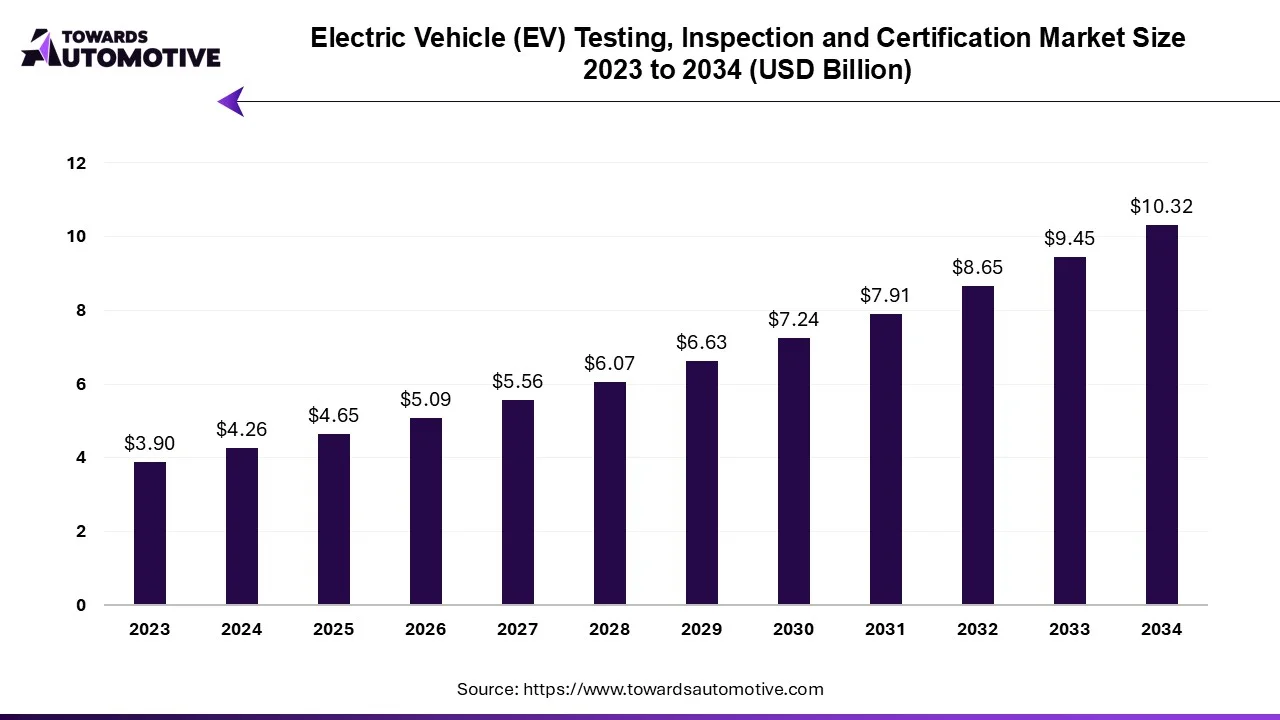
The electric vehicle (EV) testing, inspection, and certification market are witnessing significant growth, driven by the global transition towards electric mobility and the increasing adoption of electric vehicles across various segments. As governments and industry stakeholders prioritize sustainability, safety, and regulatory compliance, the demand for comprehensive testing, inspection, and certification services for EVs continues to rise.
The automotive infotainment systems market is forecasted to expand from USD 29.32 billion in 2025 to USD 46.87 billion by 2034, growing at a CAGR of 5.35% from 2025 to 2034.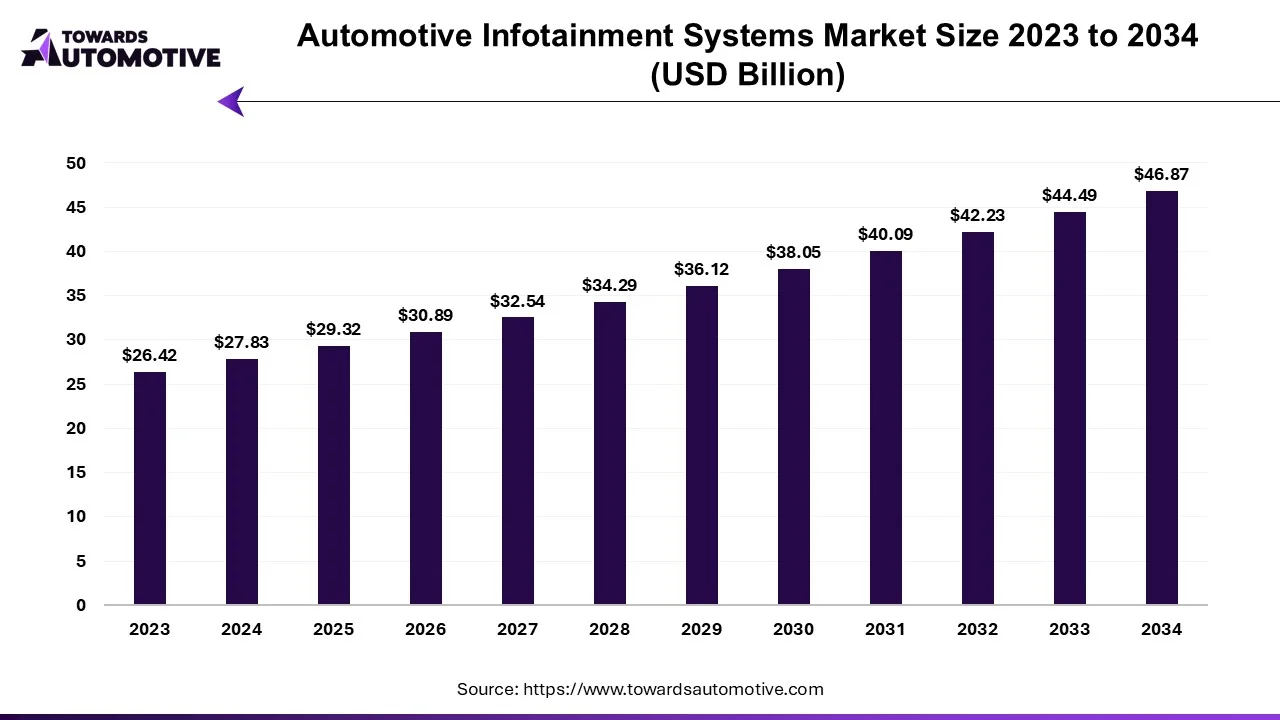
The automotive infotainment systems market is a prominent branch of the automotive industry. This industry deals in manufacturing and distribution of infotainment systems for the automotive sector. There are various types of products developed in this sector comprising of audio unit, display unit, heads-up display, navigation unit, communication unit and some others. These products are designed for different types of vehicles including passenger cars and commercial vehicles. The growing trend of integrating smart infotainment systems in electric vehicles has boosted the market expansion. This market is expected to rise significantly with the growth of the multimedia sector around the world.
The in-car infotainment market size is expected to grow from USD 8.79 billion in 2025 to USD 15.7 billion by 2034, with a CAGR of 6.74% throughout the forecast period from 2025 to 2034.
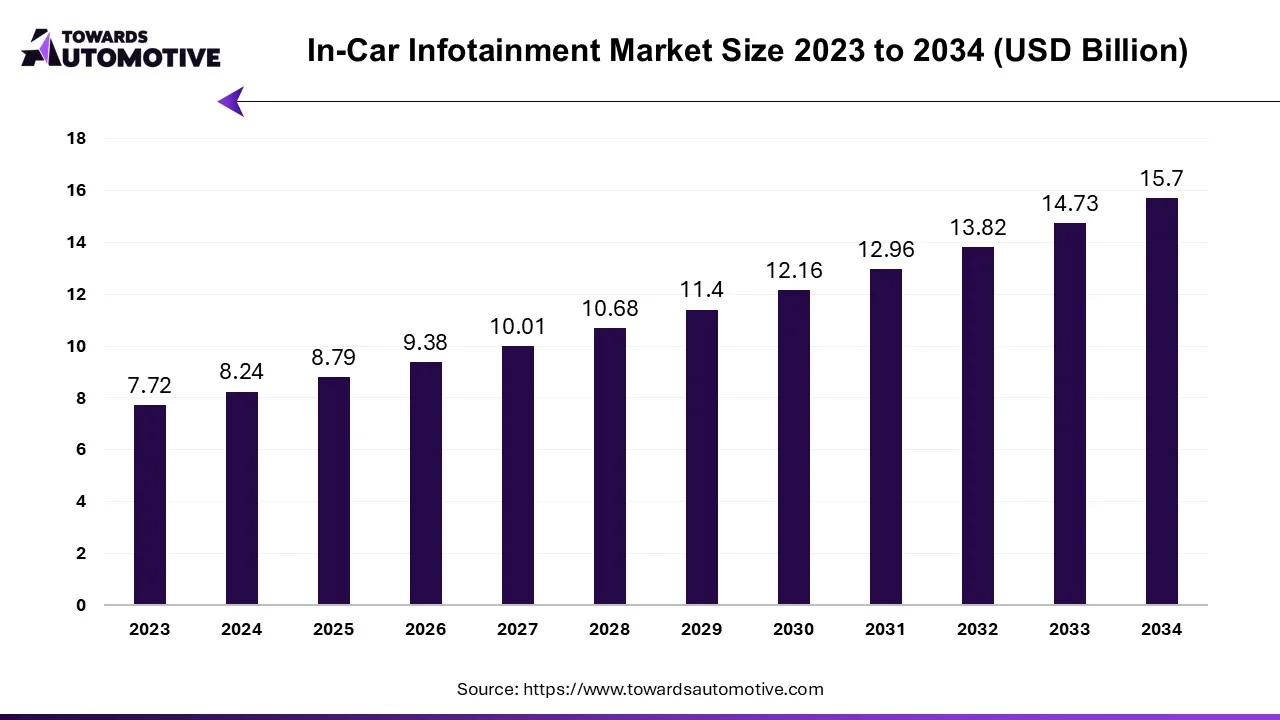
The in-car infotainment market is a crucial segment of the automotive industry. This industry deals in manufacturing and distribution of infotainment systems for automotive sector. The in-car infotainment system is a digital system that provides entertainment and information of any vehicles. There are numerous components of the infotainment systems consisting of hardware and software. The application of these systems includes navigation, media, communication, payment services, telematics and some others. These systems are available in a distribution channel consisting of OEM and aftermarket. The growing sales of passenger cars in different parts of the world has contributed to the industrial expansion. This market is projected to rise significantly with the growth of the automotive aftermarket sector.
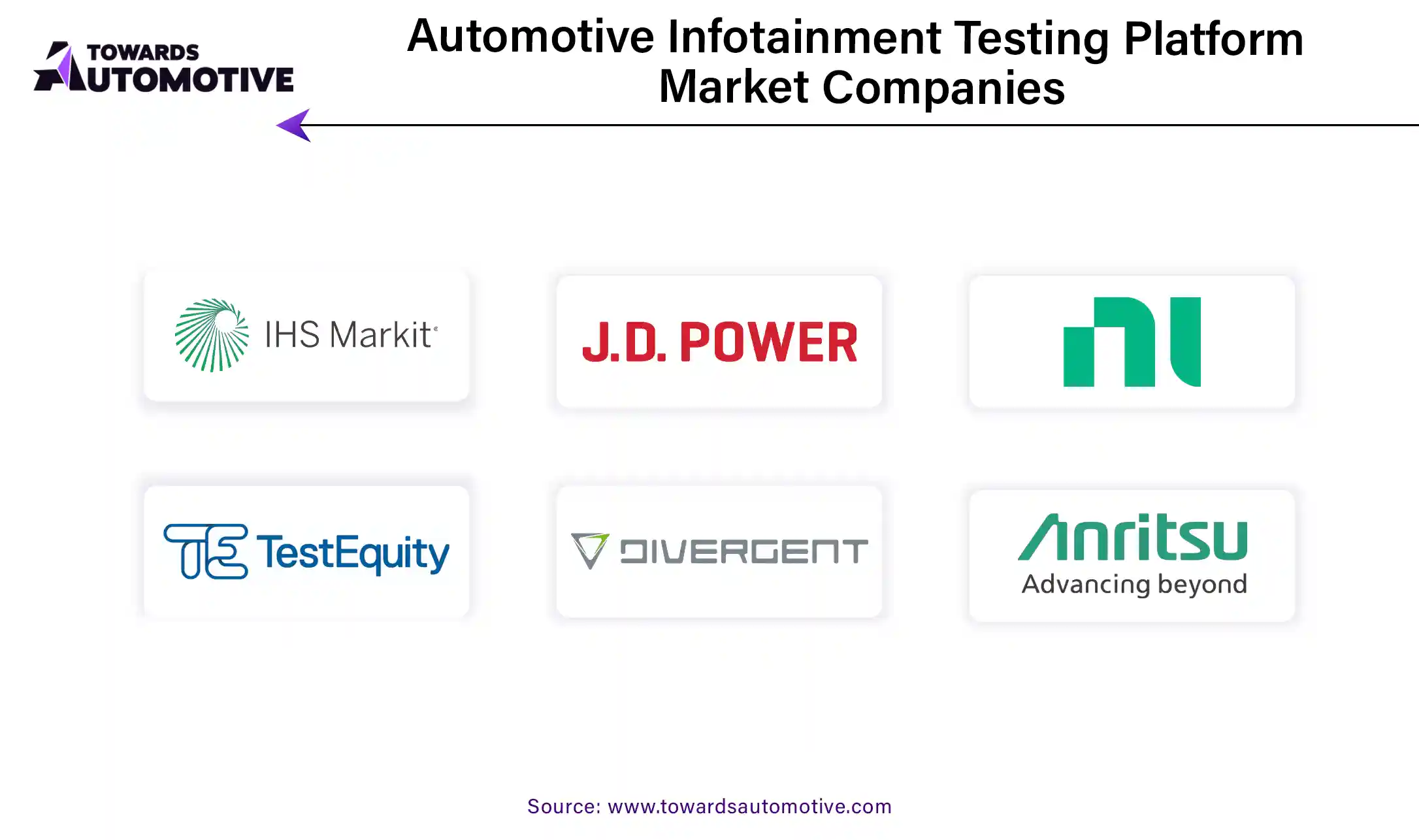
By Testing Type
By Platform Type
By Vehicle Type
By Infotainment System Type
By Region
December 2025
October 2025
October 2025
October 2025
We offer automotive expertise for market projections and customizable research, adaptable to diverse strategic approaches.
Contact Us